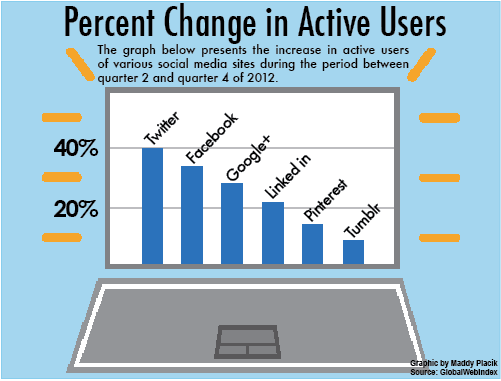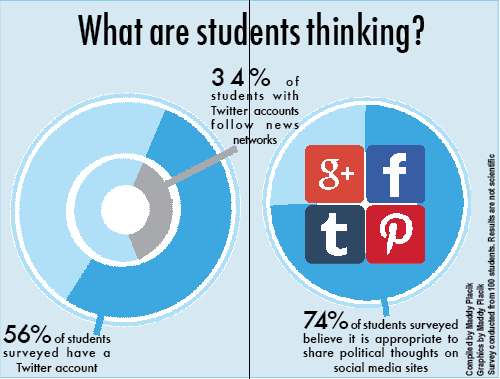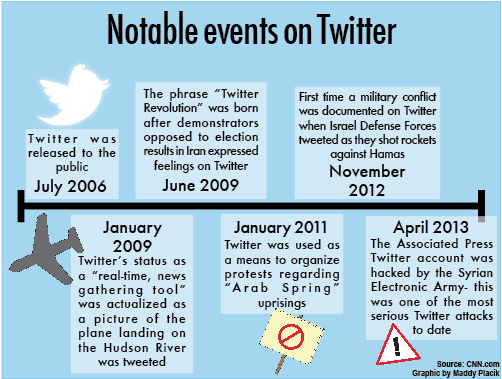
#throwbackthursday, #shutdown, and #BostonStrong all share one thing in common: the ability to unite millions of people from all across the world.
Events such as the government shutdown and the Boston Marathon bombing, among several others, were introduced to the public through various forms of news. With increasing popularity, Twitter has emerged as a major source for various news stories.
Rex Huppke, reporter and columnist at the Chicago Tribune, said he was required to create a Twitter account in order to stay updated with the multimedia aspect of newspapers today.
“Some people use [Twitter] to share stories that they’ve written, other people just use it to kind of build their own personal brand and that in turn ties in with the Chicago Tribune as well, so I think the newspaper had an interest and a motivation to get people on social media so that there was more exposure,” Huppke said.
According to Jamie Krenn, adjunct assistant professor of cognitive science at Teachers College Columbia University, social media sites such as Twitter allow the everyday citizen to have more access to various news stories. Within her field, Krenn said she studies media and people’s interpretations and uses of it. In her opinion, Twitter allows individuals to become part of the news process. In the past, when social
media played a miniscule role in society, individuals relied solely on secondhand stories from “talking heads” on television news networks. One of the key characteristics of this increased access is the ability to comment instantaneously on various news stories.
“I think the importance is the fact that you can actually have a bridge between the American people,” said Krenn. “…It kind of makes you feel like you’re…a part of the process [of news stories], or being talked to directly even though that’s obviously not the case.”
Although senior Mitchell Kasselman said he uses Twitter to express his political opinions, he said he does not believe that Twitter is a reliable news source when it comes to tweets from his peers instead of media streams.
“I wouldn’t take Twitter as a source for my information, whether it be on school gossip or whether it be actually real world stuff,” Kasselman said.
Senior Philip Ring said he created a Twitter account in the beginning of his sophomore year with the intent to write sarcastic and humorous tweets.
“I think there is [danger] with any social media because of the fact that there’s no body language in it and there’s no tone that can be picked up on it, so all you’re reading is words,” said Ring. “It’s impossible to really understand sarcasm through social media because you’re not hearing it being spoken and that’s a problem that I kind of have to face because if I’m too sarcastic, people won’t understand it or people will be offended by it, and I’m really not trying to offend anybody.”
Ring also said that due to the terse characteristic of tweets, a clear voice and opinion is not always comprehensible.
Krenn believes that although Twitter may be helpful in some aspects, it may also be dangerous when people misuse it.
According to Krenn, one of the downsides of using social media sites as a news source is that they tend to lack a filtering system, like social media streams from networks such as CNN or NBC.
Comparing the different social media sites, Krenn does not believe one is better than the other for relaying news stories.
While Krenn does believe social media sites may provide a form of news, “[they are] really like an alphabet soup,” said Krenn. “You don’t know what you’re going to pull out so it’s hard to make an accurate interpretation of a situation.”

Krenn said she does not think Twitter paints an entirely complete picture of various news stories, “but it is one of the most dramatic action-packed [sources] that we have today in real time.”
Ring said he also recognizes the fact that Twitter does not always paint a complete picture of news stories.
“I think what Twitter intends to do [is to give] you a preview of something that you can delve further into if need be without having to read that entire story,” Ring said.
In Ring’s opinion, dangers may arise if readers believe everything they see on Twitter.
“Because it’s so quick, in your face media…kids my age [are] not really gaining the full story,” said Ring. “There’s a lot of bias that’s involved and since there’s only 140 characters, you don’t really get the full story…things are always taken out of context.”
Senior David Shekman uses social media to express his political thoughts and personal opinions. According to Shekman, social media is the best way to reach a large audience, as opposed to person-to-person conversations.
Shekman said that he prefers to use Facebook over Twitter when expressing his opinions over social media.
“Some [social media] sites do limit you character-wise and don’t allow you to really get the full idea out,” Shekman said.
According to Krenn, Twitter is a unique form of social media compared to sites such as Facebook.
“[Twitter is] really just a status update,” said Krenn. “Facebook has a myriad of things…so there’s a lot of other avenues you can use to express yourself on Facebook. Twitter is just kind of weeding it down and making it more terse, to the point…getting what your message is out and very short character lengths less than a paragraph and also less than a couple of sentences so you’re forced to be concise. I think that’s why people respond so well to it because it just gets right to the point and you get your message…and it’s right there instantly.”
Huppke said he believes Twitter is a unique form of news due to the fact that tweets have a multiplier effect because of the ability to “retweet.” Huppke does recognize, however, that this multiplier effect is a “hit or miss” type of situation regarding whether or not a tweet will be publicized.
Even though posts on Facebook don’t have this “multiplier” effect, Shekman said that when he posts his thoughts on Facebook, he typically engages in conversations with other users.
“It’s better to have these discussions out there and provoke [thoughts] than just to have ignorance,” Shekman said.

While Ring’s tweets may involve a political or news event, Ring said he does not use his Twitter as a means to express political opinion.
“I don’t really love the idea of imposing your own beliefs on somebody else, kind of infringing on [his or her] freedom to really develop [his or her] own ideas,” said Ring. “So if I’m providing [facts without my opinion], they can think about it for themselves.”
In contrast, senior Mitchell Kasselman said he uses Twitter as a vehicle to express his political opinions and inform his followers about current events.
“In general, social media is the kind of place where you should feel safe [sharing political opinions],” said Kasselman. “It is designed to share what you feel and interact with other people in that kind of environment.”

